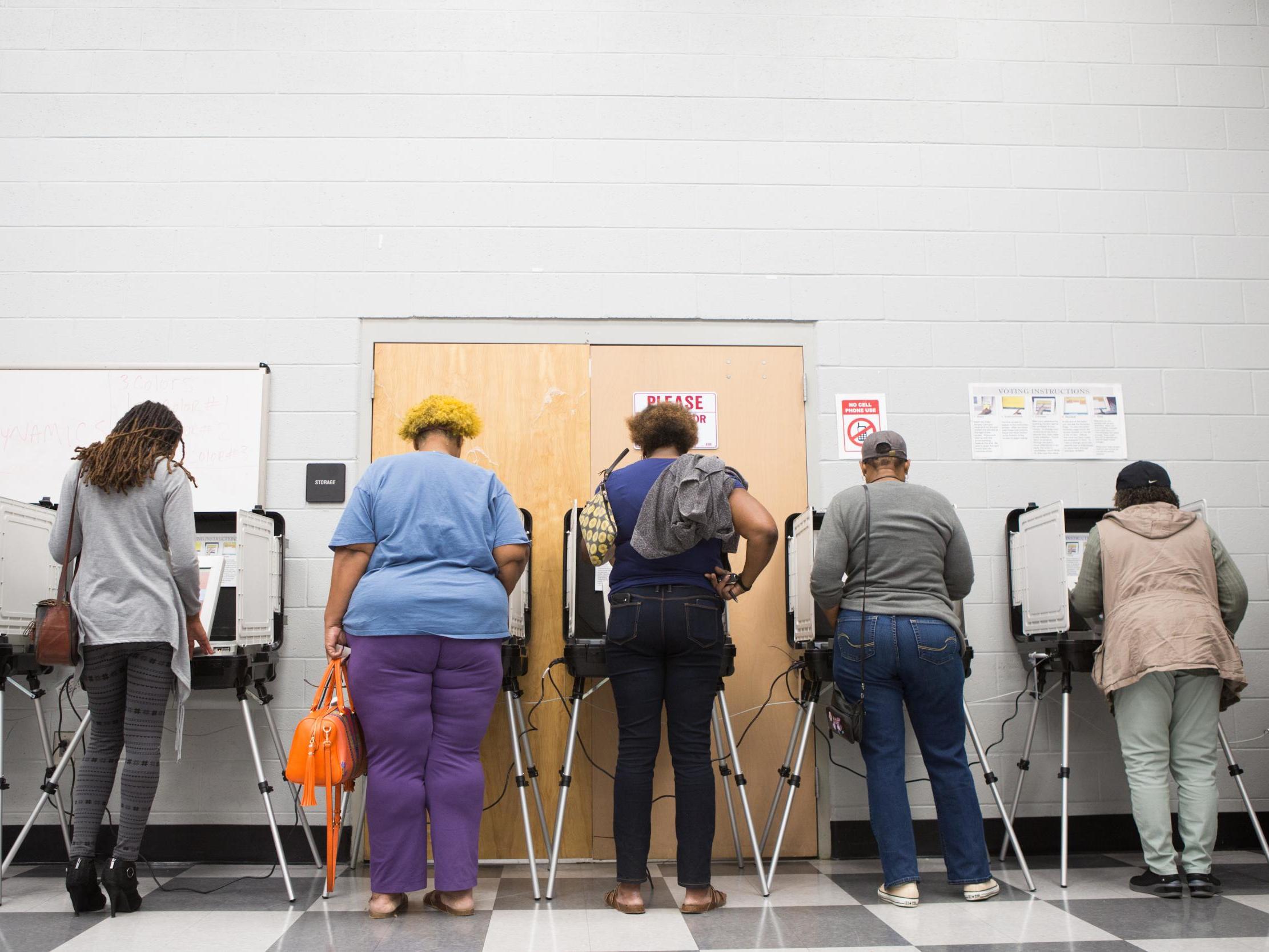‘They’d never let black folk be in charge’: How voter suppression, confusion and fear sideline minorities in rural Georgia
Clark Mindock reports on what one recent mayoral election says about voting access across the deep south state


Your support helps us to tell the story
From reproductive rights to climate change to Big Tech, The Independent is on the ground when the story is developing. Whether it's investigating the financials of Elon Musk's pro-Trump PAC or producing our latest documentary, 'The A Word', which shines a light on the American women fighting for reproductive rights, we know how important it is to parse out the facts from the messaging.
At such a critical moment in US history, we need reporters on the ground. Your donation allows us to keep sending journalists to speak to both sides of the story.
The Independent is trusted by Americans across the entire political spectrum. And unlike many other quality news outlets, we choose not to lock Americans out of our reporting and analysis with paywalls. We believe quality journalism should be available to everyone, paid for by those who can afford it.
Your support makes all the difference.Floyd Rose says his vote wasn’t counted this month.
Rose, a well known pastor who has lived in southern Georgia for decades, is a regular voter. But on the 3 December when he and his wife drove down to their local polling station to cast a ballot in the Valdosta mayoral election, something went wrong.
His registration was lost somehow, even though his wife’s was easy to find. The race was a runoff. So Rose knew the drill from just a couple weeks prior when his candidate, retired fire chief JD Rice, led with nearly 35 per cent of the vote – but missed the 50 per cent mark, instantly triggering a second round.
In the end, Rice, a black man, lost by just 96 votes, according to a tally by the board of elections. It was Scott Matheson, a white man, who came out on top. It was a result that didn’t rock any boats or bring about much change, and continued a losing streak for black candidates in an African American-majority city whose history stretches back to before the Civil War.
“This town is 51 per cent black, and every position of power for the past 159 years has been held by whites,” Rose, a black man, tells The Independent. “Every position. Black boys who run the football, kick the football, are not qualified to be the coach. The mayor’s white. Every position of power is white.”
Among election maxims, “Every Vote Counts” reigns supreme. But there is perhaps nowhere it rings truer than in elections like Valdosta’s. In municipalities across Georgia’s 159 counties, local elections are determined by margins as small as hundreds of votes — if not dozens.
Yes, every vote counts. But, as Valdosta illustrates, sometimes not every vote is counted. Often times for African Americans in rural southern Georgia, the whole franchise can appear out of grasp.
In the maxims of elections ‘Every Vote Counts’ reigns supreme. ... but, as Valdosta illustrates, every vote may not always be counted
Voting rights advocates claim that provisional ballots leave open the possibility that boards of election may simply toss out those votes, should they find discrepancies. He’s not sure why, but Rose says he believes his vote was not counted.
Fuelled by a centuries-old history of denying citizenship and human dignities to black people in the United States, towns and cities across the state with African American majority populations nevertheless have never seen their local governments led by black people.
In Georgia, voter discrimination itself appears to have its own velocity, keeping power structures in place for decades and generations.
“A lot of these counties are like little fiefdoms,” says Sara Henderson, who works on voter rights issue with the Georgia arm of the activist group Common Cause. “It feels like this sort of legacy politics. You have several, maybe, members of your family sitting on the same board or in the same elected space. Your son runs when you retire.”
Henderson said that, when confronted with what appears to be the handing down of power within families, many come to believe that this is the only way things can be: “It’s really hard to change or to convince people [to vote in those instances] because they see them in the grocery store, or whatever, and they just assume they’re in the power structure so what’s the point of trying to vote? It won’t matter.”
Denial of voting rights in Georgia takes place in a variety of ways. Some would-be voters, like Rose, may find their votes in question after they arrive and are told that a recent change of address means they have to file a provisional ballot – which ends up in the hands of the board of electors, who in some cases manually determine whether a vote is counted or not.
Georgia is a state where people relentlessly engage in tactics intended to influence the outcome of elections by discouraging people from voting
In other cases, voter roll purges like those that helped governor Brian Kemp defeat Stacey Abrams in 2018 – purges that have once again made national headlines in the country just this past month with a cut of more than 300,000 names from rolls before 2020 – mean that folks who don’t make a habit out of voting may find themselves out of luck when an inspiring candidate does come along.
And, for many others, the literal closing or consolidation of polling locations has sowed confusion among voters. Since 2013 – when the Supreme Court effectively gutted the Voting Rights Act – counties across the state have closed or consolidated at least 214 polling locations in Georgia, with some counties shutting as many as 89 per cent of their locations, including those with sizeable African American populations.
Henderson says that closures or consolidations aren’t often advertised well, especially given the fact that Georgia stands out in the US for having the least amount of access to broadband internet services. For many living in poor communities in Georgia – Valdosta alone has a 32.2 per cent poverty rate, compared to the national average of 12.3 per cent – even access to a television isn’t a given. But, even for those who do find out, the new polling location may be 20 miles away, a distance that is nearly insurmountable for a lunchtime voting trip.
“It’s created so much confusion and distrust that people just feel total apathy. Totally apathetic towards the process, because [polling consolidation] and purges continue to happen,” Henderson says.
The effort to keep people from voting is nothing new in Georgia or the American South as a whole, and dates back much further than the highly contested 2018 election that focused the eyes of the nation on the Peach State, which has voted for Republicans for decades but has shown more than a little disaffection for Donald Trump ahead of 2020.
It’s a history that includes outright violence at the polls in the wake of the emancipation of enslaved people in the US in 1863. In the decades that followed, as African Americans exercised their apparent right to vote, stories piled up including lynchings and beatings, with the perpetrators including everyone from sheriffs to business owners.
In Georgia, specifically, the tools of Jim Crow disenfranchisement adopted in the first half of the 20th century ultimately sought to cut the black voting population severely. As of 1962 – three years before the Voting Rights Act was signed into law – less than 10 per cent of the age-eligible African Americans were even registered in the thirty counties with the highest African American populations, a testament to the fear and restrictions cooked up. And, in four counties, there were fewer than 10 non-white voters registered, according to One Person, No Vote by Carol Anderson.
“In general, Georgia is a state that works overtime to disenfranchise voters,” says Rufus Davis, who became the first African American mayor of Camilla, Georgia – a town just a short drive northwest of Valdosta – in 2015. “This is a state where people relentlessly engage in tactics intended to influence the outcome of elections by discouraging people from voting.”
Camilla has a population of around 5,000, of which 72 per cent is African American. Even with that heavy tilt, Davis barely won his 2015 election. And, when he took over as mayor and began to protest the town’s lack of diversity in leadership (he claims there were just three African Americans employed in city hall at the time, including the janitor), he was denied the keys to his office by the city manager.
That denial, which brought about national media attention to Camilla, and to the difficulties faced by African Americans even when they do manage electoral success.
“I was boycotting our city government for what I believed were segregationist practices. And, discriminatory practices,” Davis says. “A lot of things came out during that time.”
With just over 10 months until election day 2020, and Trump’s approval rating in the state under water, there are signs Georgia, a Republican stronghold, could be in play for the Democrats.
But, for voters like Rose, its hard to see things changing dramatically between now and then. If local communities with predominantly black populations can’t even elect African Americans as mayor, what chance is there for major change?
Not much, he says.
“I can’t say it was rigged, but I think something happened,” Rose said of the runoff election. “I don’t know, whatever would’ve happened, I think they would have made sure that some white person was in charge.”
Join our commenting forum
Join thought-provoking conversations, follow other Independent readers and see their replies
Comments